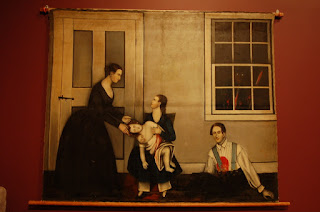LINGERING BETWEEN DOUBTS
“On one occasion after a feeling conversation with Rev. Fisk, Jack made a free acknowledgement of all his offenses; he told them he had been a drunkard and profane swearer and was totally destitute of all religious impressions, and catching Mr. Fisk by the hand, he burst into agony and tears.” — from The Report of the Trials of the Murderers of Richard Jennings
“He was alarmed and shocked! Well might he be.” boomed Jack’s lawyer, Henry G. Wisner, pointing to his client. “He beheld his friend (for friend Jennings and Jack had been) weltering in blood. He thought he saw him in the agonies of death; the groans of the sufferer piercing his soul; the feelings of nature overwhelmed him; the strong arm of conscience laid him low, and for a season, his power to act, nay, his power to will, was paralyzed.”
In case anybody is still wondering, you are reading a book. Congratulations, you made it to page 47. For those of you just joining us, lingering between doubts, better start at the beginning.
Jack Hodges sworn
By John Duer:
Q. "Have you ever shot a gun before?"
A. "Yes, I once shot a gun at a dog on Sunday."
Jack Hodges washed ashore in New York City in 1813. After a short time in the Five Points, he knew the city wasn’t for him. Looking for work, the grounded sailor made his way up the North River to Newburgh. Jack heard there was a preacher in Goshen looking for a man to work his farm. The stranger told him, if you walk due west from Newburgh, keep the setting sun in your eyes, stick to the turnpike and turn left six miles outside of Montgomery, you’ll find Goshen. Hodges knew no one in this foreign countryside. He was hoping for a fresh start.
Jack was 51 years old when his American ship was shot out from under him during the War of 1812. He had no idea that life as a landlubber was in his future. Jack was a traveler amongst the sedentary. The extreme magnetism of place (present in myself and all my ancestors), was unknown to him. Land ownership for an African American in early 19th century New York was extremely rare. Jack’s ancestors had been ripped from their tropical homeland generations before; brutalized, starved, beaten, left to freeze, or die of disease, with little more concern or ceremony than an ink line crossing out their one-syllable names in the ledger book. He had left his family back in Lancaster, gone to sea, and in spite of every imaginable hardship, had survived long enough to now face the hangman’s noose, on of all places—land.
From the time he was a ten year old waiting boy aboard the Lydia, Jack Hodges never had any pull towards blood or soil; no allegiance to any kin, or piece of dirt. He'd sailed with the Dutch, the English, and American crews in his 40 years at sea; hauled slaves and sugar for the Dutch West India Company, manned cannon for the English and blasted away, without reservation, at the same ships he'd sailed on a year before. Only five years prior to finding himself freezing on the floor of the Goshen gaol, he was sailing the world.
The mention at trial of Jack “buying a wench from Ezra Conklin for $50.” and shooting a white man for impregnating his girlfriend, leads one to believe Jack Hodges had his own conflicting issues with slavery and violence. If Jack Hodges is pulling the wool over everybody’s eyes in regard to his character, nobody seems to notice, or care. In those last weeks of winter in Goshen, the village wanted to believe that the sailor staring out the gaol window, with the low sun raking across his face, was an honorable man.
As the Presbyterian Church bell tolled, Jack craned his neck to spy the hills across the river, turning yellow and umber in the fading light. They reminded him of his Lancaster youth, and a deep-seated misery began to rise up. He hadn’t thought of his family in years, and found himself wondering if any of his siblings were still alive. How old would they be? He’d never known the security of family or community, other than on board ship, amongst men equally as lost as himself. But he did know congregation. In ports across the globe, wherever he could find one, Jack Hodges sought out church services. It was an indulgence, like drink, that Teed and Conklin would recognize and effectively exploit. What they didn’t realize was how skillfully Jack could weaponize grace in return

Comments
Post a Comment